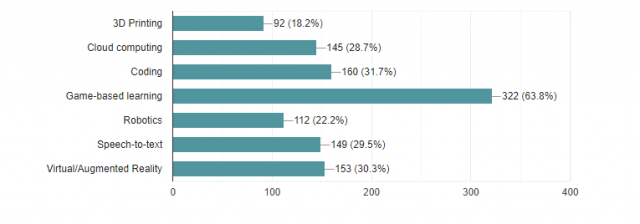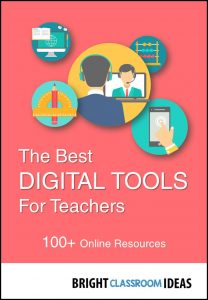Table of Contents
Education is evolving and students are learning in new ways, exploring, creating, and interacting with content through modern channels. We started an online survey aiming to map the new digital landscape, the challenges, the goals, and the tools of education professionals around the world. We have gathered all the data and present the results so far in this post.
Demographics
More that 2000 education professionals from 70 countries around the world responded to the online teaching tools survey, the majority coming from the USA, India, Egypt, Indonesia, the UK, Morocco, Nigeria, the Philippines, Saudi Arabia, South Africa, and UAE.
The majority (56.9%) are experienced educators, i.e. they have worked in education for more than ten years.

Also, the vast majority (72.7%) are working as teachers / instructors.

The respondents were almost equally divided between public and private institutions, with a small 5% being self-employed.

Most teachers are employed in small-to-medium schools, that is with up to 1000 students.

Finally, the vast majority (almost 90%) of these schools are located in urban or suburban areas.

Equipment and Use of Online Teaching Tools
This is the main part of the online teaching tools survey, where teachers reveal the tools they use and how they use them.
Most schools (24.7%) seem to follow the traditional approach, which is in-class computer stations (or labs). An increasing percentage (24.4%) asks students to use their own devices at home, most probably for homework assigned by the teachers.

Most desktop and laptop computers operate on Windows, whereas most mobile phones use the Android OS.

Almost half of the teachers asked said that they use a Learning Management System (LMS).

The vast majority of these teachers are using the LMS regularly, i.e. on a daily or weekly basis (76%).

And most of them (76%) report that the LMS has had a positive or very positive impact in their teaching.

How about new concepts and trends in education? Game-based learning is by far the most popular concept (63.8%), followed by coding and virtual reality / augmented reality (VR/AR).

When it comes to digital content, most teachers turn to YouTube (68.5%) for resources. No wonder, as we all know the power of videos.

Admitedly, all of the digital citizenship topics in our list are hot and are certainly in the minds of all teachers. Internet safety proved the most popular (62.8%), followed by communication and media literacy.

Institutional Policies
What is the approach of institutions regarding the use of online teaching tools? Do they support teachers or hinder their efforts?
Most institutions (51.3%) provide some resources to their teachers for their own professional development. For teaching purposes, almost half of them offer either classroom resources created by the school or open educational resources.

School policy on social media is mainly regulative to the extend that they are used for teaching purposes (57.6%). There are however the two extremes: schools that openly permit social media (27.7%), and school that totally prohibit them (14.8%).

We also investigated the most prevalent teaching methodologies. We were happy to find out that most of the most popular concepts are ones that this blog has covered extensively, such as formative assessment, project-based learning, flipped classroom, personalized learning, gamification etc.

In general, teachers think that their school somewhat or very effective at supporting their online or digital teaching.

This support comes in the form of workshops (74.3%), classroom observations (65.6%) or presentations (44.3%) in most cases.

Finally, it seems that collaboration at most institutions extends only within the same department (41.4%). Few schools collaborate across departments (22.1%), and even fewer across other schools (15.6%). And there are very few lucky ones who enjoy collaboration with schools in other countries (6.8%).

Personal Challenges and Goals
In this final part we explore the teachers’ personal goals and aspirations, the obstacles and challenges they face, and their self assessment when it comes to online teaching tools and technology in general.
Sadly, the biggest obstacle to learning is lack of or insufficient funding to institutions. This is an all too common finding. It seems that education is under-funded all over the world. Another hot issue is student disengagement or lack of motivation, and the consequent result, discipline issues. Education is at a crossroads. We may have the best intentions but at the end of the day we are failing our students. We need to rethink and challenge approaches that we have been taking for granted for so many years.

The teachers’ biggest digital challenge is integrating technology in the curriculum (48.6%). Sometimes the tools are there, but you have to figure out how to make them compatible with a curriculum that is not tech-friendly. Also, lack of IT support (44.2%) shows that teachers are usually left to their own devices (metaphorically and literally).

50% see themselves as very effective at using digital tools for teaching, while the other half think they are either somewhat or not effective.

As a result from all the above, most teachers’ learning goals are to integrate technology into their curriculum (76.8%), and to boost student motivation (76.5%).

Teachers’ assessment of edtech in general is that it has an overall positive impact on the learning process and student achievement (91.8%).

If you want a detailed list of the most up-to-date digital and online tools for teachers, download the ebook The Best Digital Tools for Teachers.

Useful Resources
- Online teaching tools
- What are online teaching tools?
- Online teaching tools free
- Online language teaching tools
- What is the best tool for online teaching?
- What tools do I need to teach online?


Interesting data and analysis Savas, As an online professional tutor (English, French, 11Plus, 13Plus) myself I have been impressed on how children take to learning online like ducks to water and also the considerable advantages of internet teaching compared to traditional in person teaching:) I foresee more and more learners turning to this in the future particularly with health threats present as is sadly the case presently.Thanks for sharing these insights with us Savas.
All true. Students don’t learn like they used to. We must re-think and re-imagine education.